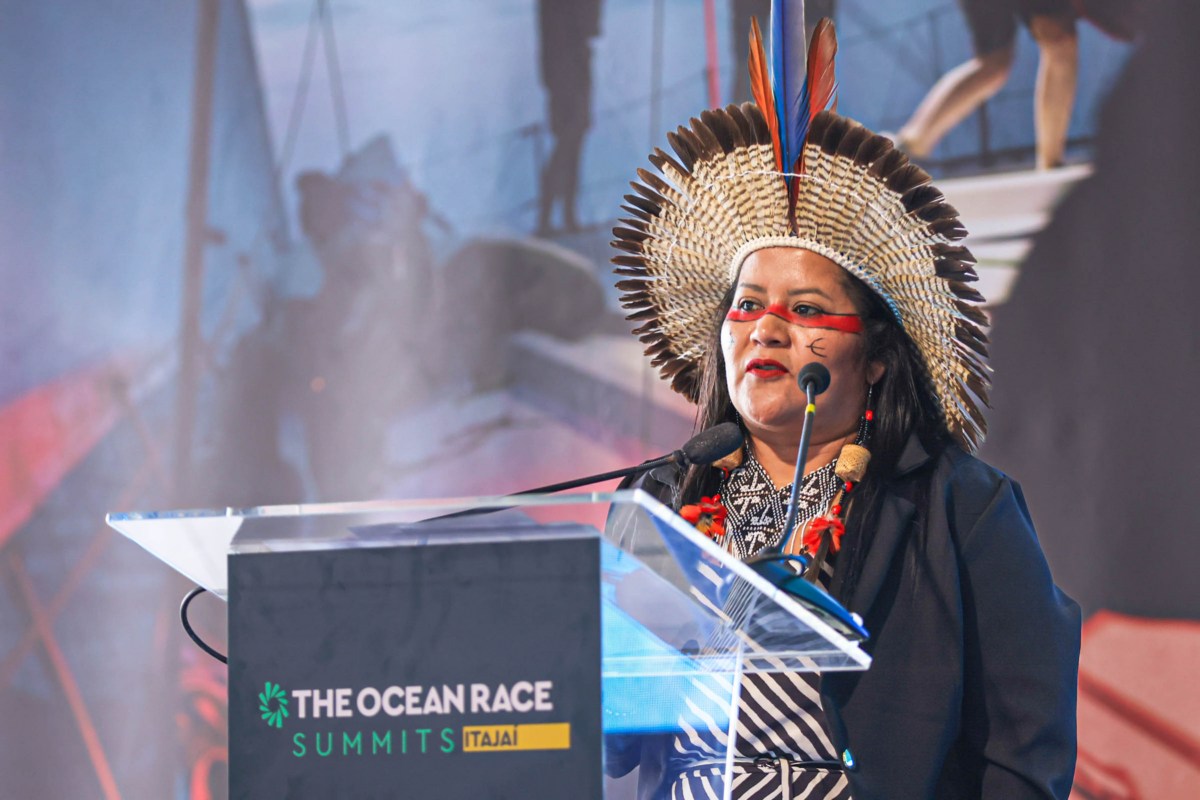At The Ocean Race Summit Itajaí, Brazil, indigenous leaders, champion sailors and decision-makers call for better governance and recognition of ocean rights.
Speaking earlier today at The Ocean Race Summit Itajaí, Santa Catarina, Brazil, Eunice Kerexu -Secretary of Environmental and Territorial Indigenous Rights of the Indigenous People Ministry of Brazil- warned that indigenous rights and better governance are critical for the success of ocean protection initiatives.
“We have a lot of respect for the ocean,” said Kerexu, who spoke of how indigenous people don’t see nature as a separate entity: “There is no ‘other’, it’s all about “us.”
She noted the general apathy towards the marine environment, despite its vital role in the health of the planet: “Where is our responsibility with the oceans that offer us more than 50percent of the oxygen we breathe?” Kerexu also spoke about the destruction of vital on-land habitats, referring to the Atlantic forest and Amazon forest as “lungs of the world that are being destroyed”. She urged the Summit participants: “Let’s talk about protection, protection and reforestation of spaces. This awareness needs to be urgent”.
Speaking to over 150 government, civil society and private sector representatives gathered at the event held at the Ocean Live Park in Itajaí, Kerexu said she was speaking as an “indigenous leader, as a technical expert and now, as a political leader”
The Ocean Race Summit Itajaí was held during The Ocean Race stopover in the Brazilian city. Since the beginning of April, Itajaí has hosted The Ocean Race for a 4th consecutive time. The fleet arrived in Brazil after the mammoth 12,750 nautical miles Leg 3 from Cape Town, South Africa, and will set sail for Newport, USA, on Sunday 23rd April in the next leg of the round-the-world Race.
Brazil, one of the world’s most biodiverse countries, has been in the spotlight for years and faced mounting international criticism for the way its rich natural environment has been depleted. Thiago Morastoni, Secretary of Tourism and Events and Economic Development of Itajaí, urged the Brazilian government “to explore and promote the concept and development of ocean rights. We need to ensure that our natural resources and the environment are protected to ensure a better future for us and for generations to come.”
This is the 10th time that The Ocean Race has stopped in Brazil, making the Auriverde nation by far the most visited country in South America. So far, over 250,000 people have visited Ocean Live Park, the dedicated race village where visitors can experience the event up-close and learn about how to protect the ocean.
Following a moving performance by children from the Tekoa Tarumá Guarani Mbya indigenous community, three panels explored how governments should ensure the rights of indigenous peoples; sailors shared their experiences of racing around Antarctica through the vast Southern Ocean; scientists explored the changes that are occurring in this critical part of the planet and what needs to happen to protect it; and political leaders explained what they are doing to tackle these issues.
The Ocean Race Summit Itajaí is part of a series of high-level events to promote the recognition of the inherent rights of the ocean, held in some of the stopover cities that are hosting the teams as they circumnavigate the planet.
The Ocean Race and partners – including the Government of Cabo Verde and US-based Earth Law Center – are working to give the ocean a voice and gather global support for the adoption of a Universal Declaration of Ocean Rights by 2030. The Summit’s discussions are later analysed and explored with experts in international law, policy, diplomacy and ocean science in a series of workshops called the Genova Process (named after the host city of the Grand Finale – the finish port of the Race).
Following his speech at The Ocean Race Summit Cabo Verde, held during the Race’s first stopover in this edition of the Race, Cabo Verde’s Prime Minister Ulisses Correia e Silva addressed the attendees in Itajaí by video message to reaffirm his country’s commitment to the conservation and sustainable use of the ocean and the need for the ocean to have legally recognised rights.
Representing the Sacred Natural Sites Brazil Initiative, Érika Fernandes-Pinto said: “We need to pay attention to nature’s sacred sites and recognise different relations between culture and nature. Most of the time our society forgets this, and to understand it, we need to talk to indigenous people, original people from their land, because they remember”.
Addressing the delegates, Vanessa Hasson, Executive Director of NGO MAPAS, UN Harmony with Nature Program, spoke about the importance of recognising that “we all are nature and nature is not for us to use. We need to use the ancestral knowledge of indigenous communities to live in harmony with nature.” Hasson described how, in Brazil, MAPAS has enabled the recognition of nature’s rights in five municipalities, the last one being the Guajará-Mirim, in the north of the country. The author of the law is, for the first time, a member of the local Warí indigenous community.
Release: The Ocean Race 1973 S.L.U., Alicante, Spain
